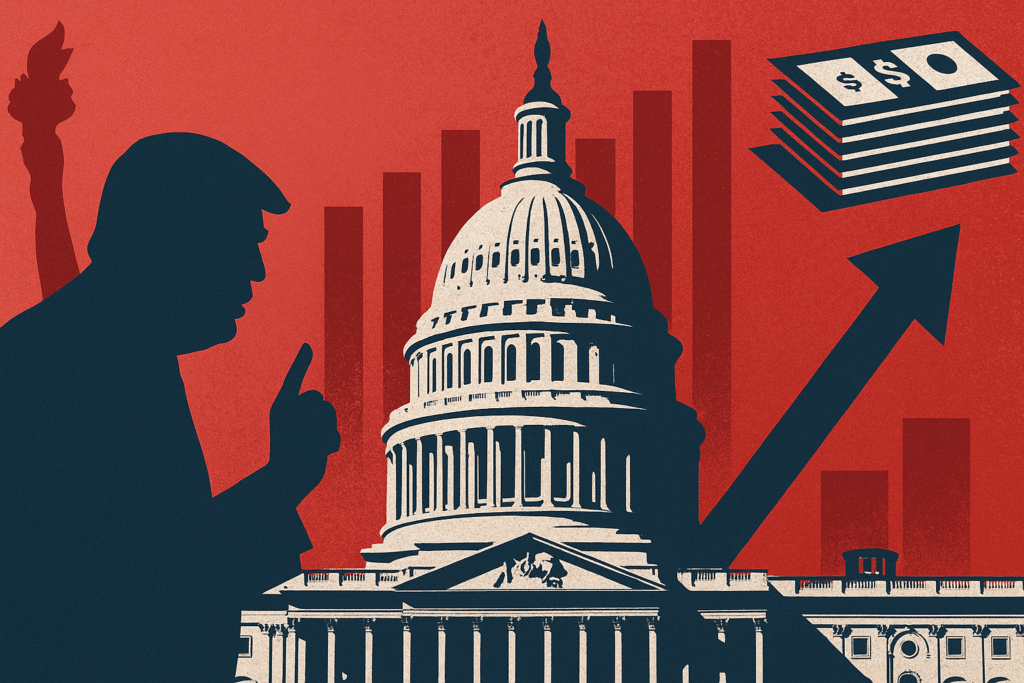The U.S. Senate remains locked in prolonged debate over President Donald Trump’s expansive tax, spending, and border security bill, with negotiations dragging into a second week amid fierce partisan divides and growing fractures within the Republican ranks.
At the heart of the bill are controversial proposals that include an extension of the 2017 Trump-era tax cuts, sweeping reductions to Medicaid funding exceeding $1 trillion, and an unprecedented $150 billion boost to the Department of Homeland Security, aimed at fueling Trump’s mass deportation agenda and expanding the U.S.-Mexico border wall.
A Divided GOP and Tight Vote Margins
Republicans, who control the Senate with a slim 53-47 majority, face unified Democratic resistance and the growing risk of internal defections. Senators Thom Tillis (R-NC) and Rand Paul (R-KY) have already voted against even debating the bill. With just three GOP defections, Vice President JD Vance would be forced to cast a tie-breaking vote. A fourth defection could sink the bill entirely.
Senator Tillis, long at odds with Trump over healthcare policy, publicly announced over the weekend that he will not seek reelection in 2026, a decision that followed Trump’s threat to back a primary challenger in North Carolina. Tillis remains opposed to the bill’s Medicaid cuts, warning on the Senate floor, “What do I tell 663,000 people in a few years when they lose their coverage?”
Marathon Voting and Amendments
The Senate’s ongoing “vote-a-rama” — a rapid series of amendment votes — has stretched more than 17 hours. Key points of contention include clean energy tax credits, Medicaid carve-outs, and food stamp protections for Alaska and Hawaii.
One high-profile amendment, proposed by Sen. Susan Collins (R-ME), aimed to raise the top income tax rate to 39.6% for ultra-wealthy Americans and double rural hospital funding. It failed in a 78-22 vote, highlighting bipartisan reluctance to introduce tax hikes even as healthcare cuts loom.
Another amendment removed a provision that would have barred states from regulating artificial intelligence, following backlash from Republicans like Sen. Marsha Blackburn (R-TN). Her amendment passed 99-1, with Tillis as the lone dissenter.
Elon Musk vs. Trump and the GOP
Tech billionaire Elon Musk has emerged as a vocal critic of the legislation. Once a top Trump advisor and the former head of the Department of Government Efficiency, Musk now warns he will fund primary challenges against GOP lawmakers who back the bill.
“This is the largest debt ceiling increase in history — FIVE TRILLION DOLLARS. We live in a one-party system: the Porky Pig Party,” Musk wrote on X. He has criticized the bill’s fiscal recklessness and its elimination of subsidies for electric vehicles — a direct hit to his company, Tesla.
Trump fired back on Truth Social, accusing Musk of hypocrisy and dependency on federal subsidies. “No more rocket launches, no more electric cars — we’d save a FORTUNE,” Trump quipped in a late-night post.
Medicaid, Reproductive Rights, and the Human Cost
The bill’s most contentious element remains the massive cuts to Medicaid. According to the Congressional Budget Office (CBO), the Senate version would leave 11.8 million people without health insurance by 2034 — nearly 1 million more than the House proposal.
An additional provision blocks Medicaid funding to clinics that offer abortion services, including Planned Parenthood, even for non-abortion care. Democrats have decried the move as a backdoor assault on women’s health access.
Faith leaders and advocacy groups protested outside the Capitol, placing more than 50 symbolic caskets representing state-by-state Medicaid losses. Chants of “you will not kill us and our people without a fight” echoed across the Supreme Court steps as the Senate debated.
Massive Spending on Homeland Security
While health programs are slashed, the Department of Homeland Security would receive a record $169 billion budget — more than double its current funding. This includes $45.6 billion for additional border wall construction and $27 billion to support a national deportation campaign.
Critics warn this would make ICE the largest federal law enforcement agency by 2029. Sen. Ron Johnson (R-WI) questioned the logic of such spending, arguing that the U.S.-Mexico border is already partially fenced and the proposed wall expansion far exceeds what’s geographically necessary.
Tensions Rise Ahead of July 4 Deadline
President Trump has demanded the bill reach his desk by Independence Day. Though the deadline is politically symbolic, actual fiscal deadlines loom — including the expiration of the 2017 tax cuts and the projected breach of the national debt ceiling by August.
White House Press Secretary Karoline Leavitt dismissed concerns from Tillis and others, insisting the bill strengthens Medicaid through new work requirements. “He is just wrong,” she said, expressing confidence that the legislation will be signed before July 4.
What’s Next
The Senate is expected to wrap up voting early July 1. If passed, the bill will return to the House for final approval. However, House hardliners — particularly from the Freedom Caucus — are also signaling their opposition, citing the bill’s ballooning cost and rushed amendments.
With the national debt approaching $37 trillion and both chambers deeply divided, the bill’s path forward remains uncertain. But its passage — or failure — will have sweeping consequences for health care, immigration, taxation, and the future of Trump’s political legacy.



